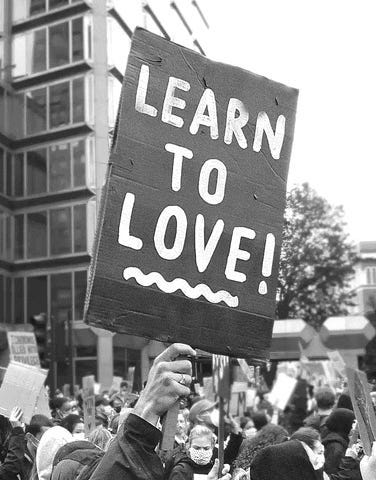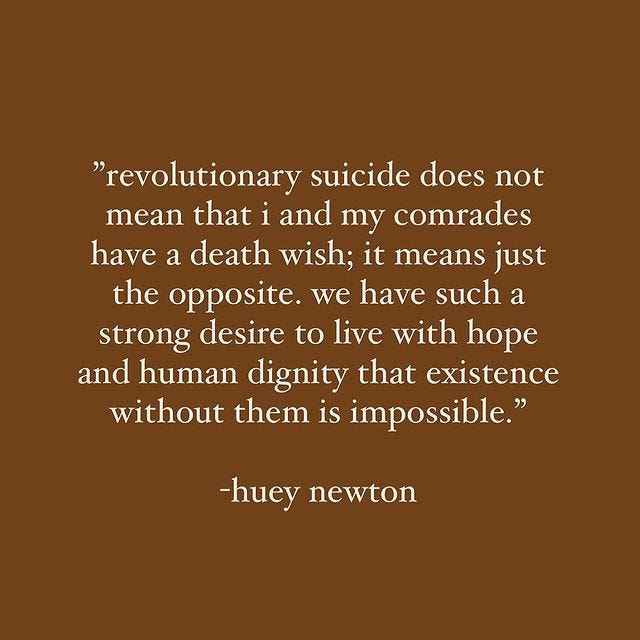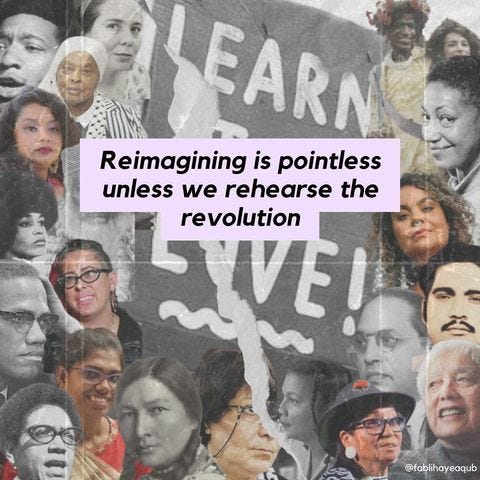archive soup: loving against a loveless world, reimagining is useless until we rehearse the revolution, and dancing to dreamy disco South Asian music
march week 1, 2024
Hi friends! How are ya? I’m currently typing away at my library and snacking on a cheese Danish <3 My weekly roundups consist of careful and intensive research. If you would like to support me, I would deeply appreciate it if you would share, comment, and become a paid subscriber. Thanks!
Reading
I just picked up Against the Loveless World, a novel by Palestinian writer Susan Abulhawa from the library this week. I came across this book after watching Jack in the Books’ and A Sunny Book Nook’s video on Palestinian book recommendations. The book follows Nahr, a daughter of Palestinian refugees, who is imprisoned in solitary confinement in a country she barely knows, left with her thoughts reflecting on the journey that led her there.
The title spoke to me in a confoundingly dreary yet empowering way. We are all grappling with the wickedness happening in Palestine, Congo, Sudan, and more and more and more. The other day, I watched a video of IOF soldiers in occupied Palestine getting on a truck and purposely running over Palestinian hostages, smushing them to death. As I watched this, I felt my brain try to protect me by reassuring me, whispering that it can’t be real, that there’s no way. But alas, my brain and I, cannot deny the truth. Every day, I am left wondering, how are people capable of doing such monstrous things? Are we, as humans, loveless people?
For the past few days, I have been talking to each of my friends. It astounds me that while such injustice is happening, life somehow continues. It feels unusual and pathetic. Most of the people in my life are Muslim “daughters” (I say that loosely as their gender identity does not correlate with being a girl. However, despite their gender identity, their role in their family still surrounds being a daughter and bearing the responsibilities) and have been navigating the extreme stress of fulfilling their duty. And while doing so, they are also facing abuse entrenched in violent misogyny. Witnessing all of this, I look at the sky and wonder, how is it that the people in our lives are also watching the world around us burn and crash and somehow manage to add to the pain and continue to hurt the people that are supposedly dear to them? Does this point in time we’re in not make them question their actions? As I think of the question that’s been swirling in my mind, I feel a sad answer forming.
[Read: smoking at prospect park made me realize that i exist beyond the identity of a brown muslim daughter]
I only read the first few pages of Abulhawa’s book and I am already struck by her unwavering words.
As I think of the title of the book, and wonder if we can love against a loveless world, I think of Palestinians loving over and over again even all while being violently eradicated. I am in awe as I watch kids singing joyously together to Dammi Falastini at a refugee camp in Gaza, surrounded by rubble. Or a boy teaching a little girl how to pray to Allah to end the war. Or Raya Hassouna playing the oud to kids at Rafah to distract them from missiles. Or a journalist playing with a baby who survived an airstrike in Gaza, after his entire life collapsed in front of his very eyes.
Palestinians have been and continue to teach us to love time and time again. Will you crumble and surrender to greed and hatred? Or will you love with Palestinians? Will you love against this loveless world?

Engaging
Recently, I read Ayesha Khan’s post, The point of life is to live (& die) for something greater than yourself, for liberation, and I cannot stop thinking about her words:
Aaron was not a hero. There are no heroes in a revolution and his words emphasized that. “Compared to what people have been experiencing in Palestine at the hands of their colonizers, it’s not extreme at all”, he said. The revolution is made up of ordinary, working class, poor people fighting for liberation, playing their role(s), en masse. Aaron played his role the best he could. He chose death in the name of Palestine rather than a life of self-centered complacency, willful ignorance and complicity which is in itself an undignified, hollow life or rather a slow meaningless death. Aaron’s self-immolation was an extreme, devastating, bold, brave, intentional act of protest. His last words were “Free Palestine.” That is where our focus should remain.
Aaron’s sacrifice is an invitation to look in the mirror, reckon with our fragility, kill our egos and deepen our commitment to the struggle for collective liberation. Most importantly, millions of Palestinians who were/ are brutalized and the countless resistance fighters who live and die for the cause have invited you to do the same. There are many communities in the global south fighting relentlessly and dying to give our planet, our home, us, a chance to live with more dignity, safety and freedom. I need you to sit with that. I need you to ask yourself- What is your role in the struggle for liberation? What is your role in serving the collective, caring for people & the land? What steps can you take to figure that out by seeking connection and building community? And this is not really a selfless sacrifice. The struggle will give you meaning, purpose and a reason to live & fight. It will anchor you to and within the collective, ground you, support you, make you YOU.
The West, (myself included. As much as I wish to say otherwise, as being born and raised in Turtle Island, imperialism idealogy has been ingrained in me to some degree. We’ve all been damaged by this system—it’s not only the capitalists who are the scoundrels, the villains; we are all part of it. And it is up to us to reject it.) were shocked by Aaron’s action. The West erupted with a mixture of disgust, disturbance, and awe—mostly because the imperialist machine that is America relies on selfish and narrow individualism that cannot conceptualize what sacrifice and dedication to liberation truly mean. But instead of reacting to Aaron’s action, how do we let him, Victor I. Cazares, and Palestinian resistance fighters move us into action?
As Ayesha says, “Their whole existence, every second of every minute, is dedicated to a cause far greater than themselves. What can we learn from them? Can we be inspired to embody even a fraction of that collectivism?”
I am thinking of Detroit-based Chinese-American activist, Grace Lee Boggs's words in her speech, Reimagine Everything.
The time has come for us to reimagine everything. We have to reimagine work and go away from labor. We have to reimagine revolution and get beyond protest. We have to think not only about change in our institutions, but changes in ourselves. We are at the stage where the people in charge of the government and industry are running around like chickens with their heads cut off. It’s up to us to reimagine the alternatives and not just protest against them and expect them to do better.
How do we rebuild, how do we redefine, how do we re-spirit our communities and one another? We can’t expect Obama or Mitt Romney to abolish the war in Afghanistan. They have put us in those wars. They have created the crisis. They are not going to solve it. We’re the ones who have to solve it by creating another kind of society and by taking advantage of their helplessness and their powerlessness to do it.
Boggs encourages us to reimagine by envisioning alternative abolitionist tools to create a greater world. But I fear that people are not truly looking deeper into what she is trying to tell us. I have seen people, even my comrades, view these ideas and tools as an abstract theory. Reimagining is useless unless we bring it into our reality. It is not enough to simply envision. We must create and practice these tools.
I am thinking of Unangax̂ scholar Eve Tuck’s words in Decolonization is not a metaphor. She says:
When metaphor invades decolonization, it kills the very possibility of decolonization; it recenters whiteness, it resettles theory, it extends innocence to the settler, it entertains a settler future. Decolonize (a verb) and decolonization (a noun) cannot easily be grafted onto pre-existing discourses/frameworks, even if they are critical, even if they are anti-racist, even if they are justice frameworks. The easy absorption, adoption, and transposing of decolonization is yet another form of settler appropriation. When we write about decolonization, we are not offering it as a metaphor; it is not an approximation of other experiences of oppression. Decolonization is not a swappable term for other things we want to do to improve our societies and schools. Decolonization doesn’t have a synonym.
When we unconsciously think of resistance, decolonization, abolition, and our reimaginings as far away and a mere metaphor, we are going further and further away from collective liberation. Instead, we give these ideas no fuel and no breath to survive. By not putting it into action, it turns into dust and ceases to exist, slipping through our very fingers.
But how do we *actually* practice our reimaginations? It is by rehearsing the revolution.
Inspired by Brazillian artist Augusto Boal’s book Theatre of the Oppressed (1974), he inspires us all to activate communities as performers to enact change. Empowering them to creatively share their stories through performances, games, and stories, allowed them to examine solutions to a common issue (patriarchy, classism, etc.).
It is by educating, agitating, and organizing. (Although this slogan was inspired by European leftists, this saying was popularized by Ambedkar as he believed this to be the three pillars towards freedom.)
It is by creating conversation with one another, joining our local organizations, acting as a menace, and challenging our oppressors that will help us to rehearse the revolution in our everyday lives. It is until we give our reimaginations life that will enact the revolution.
So I ask you today: How will you reimagine a better world? How will you rehearse the revolution? How will you and I rid ourselves of individualism and embody collectiveism?
Listening
My sweet friend, Sony, introduced me to Indian singer-songwriter Asha Puthli! Puthli’s music is a beautiful world of blues, pop, rock, soul, funk, disco, and techno all into one. Whenever I listen to her songs, I feel like I’m floating into a dream.
I’ve been loving listening to Let Me In Your Life and Space Talk.
That’s all for this week!










im at work and not even finished reading this, but i already want to say yes and thank you💞